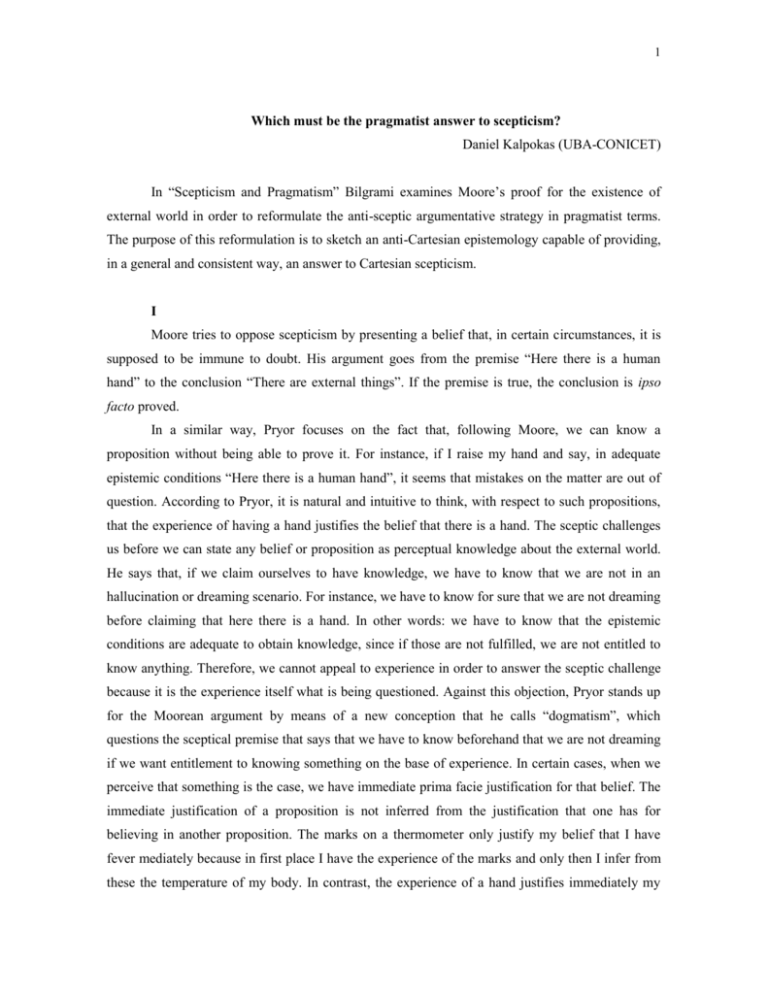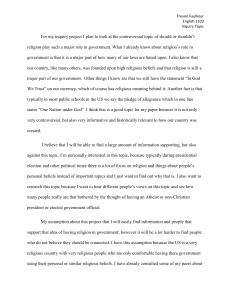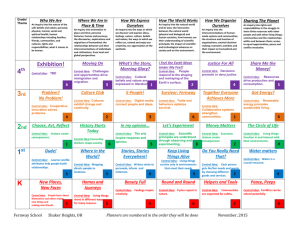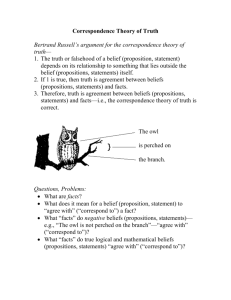La respuesta pragmatista al escepticismo
advertisement

1 Which must be the pragmatist answer to scepticism? Daniel Kalpokas (UBA-CONICET) In “Scepticism and Pragmatism” Bilgrami examines Moore’s proof for the existence of external world in order to reformulate the anti-sceptic argumentative strategy in pragmatist terms. The purpose of this reformulation is to sketch an anti-Cartesian epistemology capable of providing, in a general and consistent way, an answer to Cartesian scepticism. I Moore tries to oppose scepticism by presenting a belief that, in certain circumstances, it is supposed to be immune to doubt. His argument goes from the premise “Here there is a human hand” to the conclusion “There are external things”. If the premise is true, the conclusion is ipso facto proved. In a similar way, Pryor focuses on the fact that, following Moore, we can know a proposition without being able to prove it. For instance, if I raise my hand and say, in adequate epistemic conditions “Here there is a human hand”, it seems that mistakes on the matter are out of question. According to Pryor, it is natural and intuitive to think, with respect to such propositions, that the experience of having a hand justifies the belief that there is a hand. The sceptic challenges us before we can state any belief or proposition as perceptual knowledge about the external world. He says that, if we claim ourselves to have knowledge, we have to know that we are not in an hallucination or dreaming scenario. For instance, we have to know for sure that we are not dreaming before claiming that here there is a hand. In other words: we have to know that the epistemic conditions are adequate to obtain knowledge, since if those are not fulfilled, we are not entitled to know anything. Therefore, we cannot appeal to experience in order to answer the sceptic challenge because it is the experience itself what is being questioned. Against this objection, Pryor stands up for the Moorean argument by means of a new conception that he calls “dogmatism”, which questions the sceptical premise that says that we have to know beforehand that we are not dreaming if we want entitlement to knowing something on the base of experience. In certain cases, when we perceive that something is the case, we have immediate prima facie justification for that belief. The immediate justification of a proposition is not inferred from the justification that one has for believing in another proposition. The marks on a thermometer only justify my belief that I have fever mediately because in first place I have the experience of the marks and only then I infer from these the temperature of my body. In contrast, the experience of a hand justifies immediately my 2 belief that this is a hand. Moreover, this justification is prima facie in the sense that it can be defeated by additional evidence, although in absence of such evidence, we consider the belief as justified. Thus the immediate justification of what Pryor calls “perceptually minimal beliefs” does not refute the sceptic challenge by denying fallibilism. Although justification is prima facie, the sceptic challenge can be answered. There is not a precondition that compel us to deactivate the sceptical doubts, for the prima facie justification can only be defeated if there is empirical evidence for such doubts. Only in those cases it is necessary to prove that sceptical doubts are not justified before accepting perceptual beliefs based on experience. In standard cases, when we have prima facie justification and there is no evidence against it, we assume that we have justified beliefs. There is, thus, the presumption that our perceptual beliefs are justified by experience. In consequence, the Moorean answer to the sceptic is that we have grounds (i.e. certain experiences in paradigmatic situations) that immediately and in a prima facie way justify our beliefs about the external world. What the immediate justification provides is a way of justification that it takes place without the need of previously justifying the belief that we are not dreaming. The immediate justification does not require proving that we are not in the skeptical scenario. Certainly there are justified beliefs working in the background (beliefs such as “My senses are working well now”), which are necessary to the immediate justification of perceptual beliefs (i.e. Here there is a hand). But these kinds of beliefs don’t work as premises in the justification of my belief that there is a hand here. Those beliefs are not connected to perceptual beliefs in the same way as my belief that the thermometer marks 38° C to my belief that I have fever. From my point of view, there remain many doubts about this anti-skeptical strategy because what the sceptic questions is the class of background beliefs itself that makes possible the immediate justification of perceptual beliefs. Normally we assume that there is a presumption in favor of justified beliefs on the base of experience; and certainly we do revise the justification of certain beliefs only when evidence against them it’s raised. However, this normal and standard procedure is not still an argument against the sceptic. I don’t see any reason here that can explain why we wouldn’t have to consider the Cartesian doubts about the epistemic conditions of perceptual beliefs. Only if we had an argument proving the inconsistency of global and radical sceptical doubt we could accept Pryor’s Moorean answer. I cannot elaborate this point here, but I will say something more about that regarding Bilgrami’s pragmatism. II Bilgrami tries to separate the justificatory presumption of perceptual beliefs from the Moorean point of view. Pryor introduces from the beginning the distinction between experiences 3 and perceptual beliefs. But, in Bilgrami’s opinion, the mentioned presumption doesn’t need that distinction; at least not from the beginning. The distinction between experience and perceptual beliefs should be introduced only later, in order to explain the mistake when doubts about that sort of beliefs arise. If we eliminate the Moorean insight from the presumption of justification by default, we can develop a pragmatist anti-Cartesian epistemology. The presumption says: (PV) There is a presumption that our perceptual beliefs are true unless there is empirical evidence against them. This statement says that there is a kind of beliefs which are considered true without need of justification, “since without positive evidence to the contrary which might raise certain specific doubts about them, there is no need to worry about justifying them” (p. 6). I think that (PV) is true both as a descriptive and a normative statement. On the one side, (PV) reflects phenomenologically what we do when we are in the inquirer’s position. On the other, from the point of view of empirical inquiry, we cannot start doubting of everything. We have to assume a background of beliefs about which we are certain. However, why would we have to accept (PV)? What is the argument for accepting (PV)? At this point, I think that (PV) by itself is not enough for rebutting the sceptical arguments because these put into question the very idea of empirical evidence, for or against, a belief. According to (PV) we consider perceptual beliefs as true unless there is empirical evidence against them; but (PV) does not say that perceptual beliefs are true. Although we are entitled to consider unquestioned perceptual beliefs as true beliefs, being mistaken about them is logically possible. Here the sceptic questions the whole experience and perceptual beliefs. She tells us that the subjective experience could be exactly as it is even if there were no material things. Therefore, it seems that we cannot ask for empirical evidence neither in favor nor against perceptual beliefs. What is required, in my opinion, is to discredit the sceptical argument which questions the possibility of empirical knowledge. In other words: we need an argument for the restriction of evidence to empirical evidence. Bilgrami does sketch such an argument. He connects (PV) with the following pragmatist principle: (PP) Nothing should make a difference in epistemology, if it does not make a difference in inquiry. Bilgrami thinks that (PV) can be “inferred” from (PP). Therefore, Bilgrami’s argument against scepticism is that the mere logical possibility of us being mistaken (i.e. if we are dreaming) 4 does not make a difference in inquiry. But, what kind of inquiry is he referring to? Bilgrami concedes that there are two sorts of possible considerations: empirical and a priori. Immediate prima facie justification is susceptible of refutation only by empirical evidence. But then, why only empirical evidence would make a difference to inquiry and epistemology? A priori Cartesian considerations make a difference only if one thinks that philosophy is a kind of inquiry. But Bilgrami rejects such idea: “Only intellectual activities which traffic in empirical considerations of the sort that Pryor allows as defeaters count as inquiry” (p. 10). This is the explicit presupposition that complements (PP). Bilgrami thinks that the idea of philosophy as a kind of inquiry is incompatible with (PP). Thus, he believes that scepticism can only be formulated within a frame that considers philosophy as inquiry. And he rejects that philosophy is an inquiry at all. How does it look, then, the pragmatist epistemology proposed by Bilgrami? Here Bilgrami takes some Wittgensteinean ideas. According to his point of view, the so called “hinge propositions” have a conventional and institutional status. This means that empirical evidence about them is irrelevant because hinge propositions don’t state any fact. In other words: hinge propositions are not verifiable by empirical evidence. From the pragmatist point of view, there are beliefs about which we have certainty and that the reason why they don’t need to be justified by us. And there are other kinds of beliefs –hypothesis- about which justification is required. But while inquiry is going on and we try to justify hypothesis, we cannot doubt about the very same beliefs we are using to verify the hypothesis, because they constitute the standard for inquiry. In contrast to Wittgenstein, Bilgrami affirms that beliefs about which we have certainty, although in no need of justification because they cannot be questioned by the mere logical possibility of being false, could be questioned by specific empirical evidence. Bilgrami extends the class of hinge propositions: it not only includes propositions such as “There is a material world”, but also propositions such as “I have a hand” and every proposition we sustain with certainty during the inquiry. Thus, on one hand, hinge propositions don’t have an institutional status because we can doubt them on the basis of empirical evidence. On the other hand, they have an institutional role in a certain way because they are the standard of hypothesis verification while the inquiry is going on. III In what follows, I’d like to present some thoughts about this answer to the sceptic. First of all, I want to stress my sympathies to pragmatism. Therefore, my observations must be understood as discrepancies with regard of what should count as a pragmatist epistemology. I will offer arguments against the following two points: 1) Bilgrami’s answer to the sceptic, and 2) Bilgrami’s conception of hinge propositions. 5 1) Bilgrami thinks that we don’t have to worry about being globally mistaken (as happens in the possibility of being dreaming now) because, from the point of view of inquiry, we simply consider as true every belief we use as long as there is no empirical evidence against them. However, as I have just pointed out, that is not enough for answering the sceptic because she questions the epistemic conditions from which we judge the empirical evidence. Perhaps because of that Bilgrami adds the principle (PP) according to which the mere possibility of dreaming is discarded because that general doubt cannot introduce any difference into inquiry and hence, into epistemology. But we have seen that this argument implies the thesis that philosophy is not a kind of inquiry. My doubts aim to this idea. It seems that, if philosophy was not a kind of inquiry, it couldn’t have truth as a goal. Every non philosophical inquiry would have truth as a goal, but philosophy wouldn’t. However this thesis is a performative contradiction for, is it true? Don’t we have to consider truth as the goal in our discussions regarding the status of philosophy as a kind of inquiry? Moreover, if philosophy were not a kind of inquiry, it seems that it wouldn’t have any theory as its result. But then, how are we to understand the pragmatist epistemology and its answer to scepticism? If it is argued that philosophy is an inquiry, an empirical inquiry, then we have not answered the sceptic yet. And if what is claimed is the impossibility of philosophy being an a priori activity, then we should argue for this controversial thesis. However, in my opinion, the point is not about the nature of philosophy. The point is that there is an argument –the radical sceptical argument- that questions our whole experience. If Bilgrami’s argument against scepticism implies, at the end, that controversial thesis about the nature of philosophy, I think it would be better to look for another kind of anti-sceptical arguments. Fortunately, there are such kinds of arguments. In “Realism and relativism” Bilgrami grants that sceptical hypothesis about malign genies and brains in vats are logical possibilities. Those hypotheses “make vivid the logical possibility of the falsehood of empirical belief in general” (p. 14). In contrast, what I am suggesting is that we don’t have to grant that logical possibility. I think that different but similar arguments such as Peirce’s, Davidson’s and Wittgenstein’s have showed us that radical sceptical doubts are inconsistent. For instance, Peirce argues against Descartes, that we cannot entertain global doubts because doubting is not voluntary: “Let us not pretend to doubt in philosophy what we do not doubt in our hearts”. Notice here that this argument does not mention empirical nor a priori reasons; and it supports the idea that we only put beliefs into doubt in the face of particular and concrete evidence against them. Peirce also points out a logical problem against scepticism: genuine doubt requires specific reasons, and this makes complete, systematic doubt impossible since the very same reason for doubting is something else one believes. In other words: doubting presupposes believing. This last argument has certain affinities with the Davidsonian coherentist argument against scepticism: we cannot 6 doubt every belief at the same time because, if so, there wouldn’t remain any propositional contents to doubt about. Mistakes only have sense in the context of true beliefs. Radical doubt is not a logical possibility. Finally, Wittgenstein, as known, argues against the consistency of Cartesian dreaming argument: if I am dreaming now, I cannot know that I am dreaming. I think that those reknown arguments do a nice job in rejecting the sceptical doubts about the epistemic conditions in which we have experiences and state perceptual beliefs. Having proved thus the intrinsic inconsistency of radical scepticism, we can base the pragmatist epistemology on a firmer foundation. 2) What is wrong with Bilgrami’s conception of hinge propositions? If all hinge propositions can in principle be put into question by specific empirical evidence, don’t we need to suppose certain special propositions for doubting hinge propositions? For instance, is it empirically refutable the belief which says that whenever we research something we presuppose the existence of a possible truth for the problem considered? Which is the empirical evidence that could question the proposition which says that when we make an assertion we presuppose a true claim for the assertion? And which is the possible empirical evidence that could question the proposition which states that every belief can be, in principle, justifiable? Or the possible empirical evidence against the proposition that there is a material world? None of those propositions are learned in an explicit way. None of it seems to be acquired by means of direct experience, nor seems to be justifiable or refutable by experience. Those propositions seem to be conditions of possibility for thought and action. Indeed, they are interwoven essentially with our human way of life. And for sure to think of different propositions would be to conceive a different way of life. What I mean is that those propositions don’t seem to be mere empirical propositions. If I am right, we would have to think of those propositions as having a transcendental role: they are the possibility conditions for thought, action and inquiry. 7





